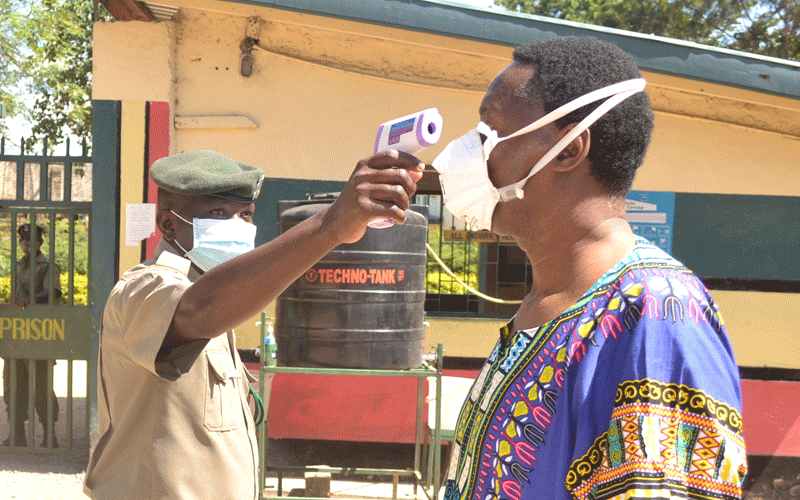Prisoners find masked opportunity in Covid-19
By Boniface Msangi, August 11, 2020As Covid-19 pandemic continues to wreak havoc across the world, government installations such as prisons where social and physical distance is a challenge, remain some of the weakest links in the fight against the disease.
In Kenya, the situation could be exacerbated by overcrowding and poor hygiene, which are hallmarks in prisons.
Records indicate that Prison facilities in the country accommodate up to 51,130 inmates on average.
At the Shimo La Tewa prison in Mombasa, inmates are now taking matters into their own hands to protect themselves from the virus by embarking on mass production of masks.
The regional head of Prisons, Aggrey Onyango said inmates at the Shimo La Tewa prison are manufacturing 1,300 three-ply face masks daily. They are targeting more than 4,000 inmates in different correctional institutions.
Spared the worst
“We are producing face masks of the required standard at Shimo La Tewa Maximum prison to cater for the high demand from intimates and prison officers. We are not taking risks,” said Onyango. Prisons have not been spared the worst of the Covid-19 outbreak.
Out of the 12 Covid-19 cases reported in prison facilities at the Coast, only two are currently in isolation at Shimo la Tewa Maximum Prison and are responding well to treatment under supervision of specialised health workers.
“Covid-19 cannot make us run away from our obligation as Prisons Service. We are only accepting positive cases at prison isolation centres under strict guidelines of trained Covid-19 health workers,” stated Onyango.
He said the prisons department has set up three isolation and quarantine centres– one at Shimo La Tewa, which is sub-divided into three; for male, female and in Bostol prison.
Others are Malindi Prison, which serves Covid-19 inmates from Malindi, Lamu and Hola and Manyani Prison, which serves the entire Taita Taveta County.
Shimo La Tewa, Bostol isolation have got 15-bed capacity isolation centre, 16-bed capacity quarantine centre while Shimo women prison has a 20-bed capacity isolation centre and 13-bed capacity quarantine centre. Shimo male prison has got a 60-bed capacity isolation centre and a 111- bed capacity quarantine centre.
Malindi Prison has a 15-bed capacity isolation centre and a four-bed capacity quarantine centre while Manyani Prison has a 20-bed capacity isolation centre and a 30-bed capacity quarantine centre. Wundanyi Prison has a 10-bed isolation centre.
“The first Covid-19 positive case brought to Shimo la Tewa prison caused panic, but with time, the prison community has adapted and everyone is now playing their role in fighting the virus,” he added.
Onyango admitted that the outbreak of the virus has changed daily prison routine operations as inmates with court cases have to attend virtual court sections while others have stalled.
“We are slowly adapting to virtual court sessions to serve justice, but it is still a challenge as we do not have enough laptops,” said Onyango.
Acting Health Director General (DG) Patrick Amoth during his visit at the coast said prisons still remain a concern in the fight against Covid-19.
“We are working closely with prisons authorities to reduce exposure in prisons because the facilities are facing a risk,” he said.
Khamisi Bakari, Assistant commissioner of prisons in-charge of Kilifi county said despite there being no reported case in the area, the virus has disrupted operations at the facilities.
Bakari said the outbreak has completely locked out visits, thus physiologically affecting them.
He said Covid-19 has also brought a shortage of essential goods at the prisons including soaps, which inmates used to receive from family and friends.
Deplorable conditions
Families with loved ones who are incarcerated worry about the unhealthy conditions and the inability to social-distance in crowded cells and facilities.
Hamisi Juma is afraid his brother, who is serving a 10-year sentence at Shimo la Tewa Maximum Prison, could be exposed to the virus.
“We have not seen or heard from him since March. We are worried because of the deplorable conditions they live in.
It is almost impossible to keep his hands clean. They can’t observe social distance because the prison is congested,” said Juma, who did not want to disclose his brother’s name or why he was in prison.
According to the World Health Organisation (WHO) efforts to control Covid-19 in prison communities are likely to fail if strong infection prevention and control measures, testing, treatment and care are not taken.
Health Cabinet Secretary Mutahi Kagwe had previously warned there is a risk of virus transmission between prisoners, staff and visitors.
As such, the Kenya Prisons Service stopped visits since March when the first Covid-19 case was reported in Kenya.
In April, Kenya released nearly 4,000 inmates as part of efforts to avert a Covid-19 outbreak in prisons.
Although these measures have helped slow down the spread of the virus, rising cases at the community level poses a risk to the prison community.
So far, close to 100 inmates across the country, have tested positive for the deadly virus.
The first case of infection was reported in May where public health officials said that 31 prisoners at the Nairobi Remand and Allocation Prison were infected.
A few days later, a prisoner tested positive for the virus at the Embu GK Prison.
Dozens of inmates who have come into contact with positive cases have also been quarantined.
